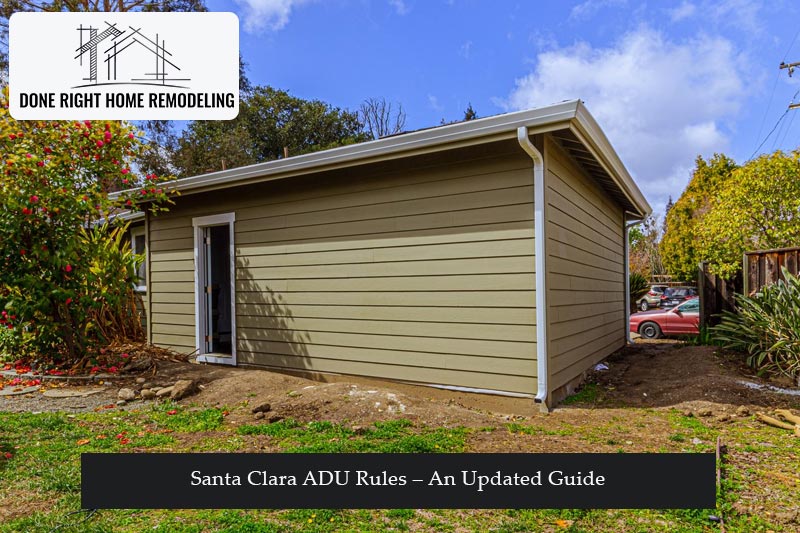LIC #: 1002689
If you are thinking of creating Accessory Dwelling Unit in Santa Clara then you must follow Santa Clara ADU rules that have been updated recently. Since then, a lot of Santa Clara homes are now considering a value-based extensive space addition, as the state government laws have been considerably relaxed. This has urged homeowners of going ahead with their plans for ADU construction at their properties.
As per new Santa Clara ADU rules, any construction below 750 sq. ft. needn’t pay any ‘impact fee’ to the local land development authority. Moreover, now an ADU of 1200 sq. ft. can have a ceiling height of 16 feet.
With such ‘welcome’ relaxation in rules, a lot of California homes are now going ahead with their long pending plans of ‘Granny Flats’ construction within their homes. Now, homeowners are even allowed to build one regular size and a Junior ADU at a single property. So, no more space crunch. As the festive season is nearing, try contacting one of the reputable Santa Clara ADU builders, and get the job done.

Santa Clara County provides second homes (or accessory dwelling units, or ADUs) in zoning districts that allow residential uses. Specific provisions exist for rural zoning districts and urban districts and vary by lot size.
ADUs can be attached or detached, new construction spaces, or converted from an existing structure. A complete kitchen and bathroom, as well as living, sleeping, dining, and cooking areas, are required in an ADU.
A Junior ADU (Jr. ADU) must also be contained within a single-family home and have a maximum square footage of 500. It must have a separate entrance and an efficient kitchen but can share a bathroom with the main house.
California has enacted laws regarding Accessory Dwellings that became effective on January 1, 2020. The County has updated its Ordinances to reflect these new laws. The new ordinance was adopted on March 10, 2020. Please continue reading this article until the end so that you can have a clear idea about the new Santa Clara ADU rules.
The new Santa Clara ADU Regulations are outlined below:
City or County: Santa Clara County, California
Date updated: 29.11.2020
Zoning:
Allowed urban districts: R1/R1E/RHS/R1S/R3S/R2/R3
Permitted rural areas: A/AR/HS/RR
Commercial and Industrial Permitted: CN, CG, OA
Special Purpose: A1, RS
Number of ADUs:
One ADU and one JADU are allowed in single-family homes. For multi-family lots, 25% of the multi-family units are allowed for units converted from an existing structure, plus two separate ADUs per lot.
Types of ADUs: Detached, Attached, and Junior ADU
Stories: N/A
Maximum ADU area:
Attached:
Primary Residences [< 1,600 sf] – 800 sf max;
Primary Residences [1,600 – 2,400 sf] – 800 sf min, but no more than 50% of primary residence Primary Residences [>2,400 sf] – 1,200 sf max
Detached:
1,200 sf max. However, the law allows additional square footage as follows:
Lot coverage: You must adhere to the coverage limits of the underlying zoning district.
Bedroom: N/A
Storage: No min/max
Kitchen: Requires separate kitchen facilities.
Bathtub: ADUs require separate restrooms. Junior ADUs may include a separate bathroom or may share a bathroom with the existing structure.
Parking lot: One off-street parking space per unit is required for standard ADUs. None is required for Junior ADUs.
Exemptions to provide additional parking space:
Setbacks:
Front: Follow the guidelines of the underlying zoning district.
Back: 4′ and Side: 4′
Height: Same as a primary residence if ADU meets residential setbacks, 16′ otherwise. Detached ADUs greater than 16 feet must incorporate a hip, gable, or other similar-style roof design.
Location: Urban ADUs cannot be within 6 feet of the primary residence.
Backyard coverage: You must follow the requirements set forth by the zoning district in which the lot is located.
Design:
Unless indicated in Priority Lists No. 1 and 2, design standards are advisory. Certain features, materials, or shapes may be required through design review or approval. New ADUs might be subject to a light reflectivity value (LRV) requirement of 45 or less for the façade and roof.
If your lot is a registered legal lot that has an existing single-family residence (or a single-family residence is being built on it) in a residential or mixed-use zone, California state law allows you to build up to one ADU and one Jr. ADU if there are adequate water and sewer services, minimum separation requirements are maintained, and fire and life safety standards are met. ADUs must adhere to building code requirements, which may include planning reviews and building permits that might impose extra conditions, like parking.
You can build up to one ADU and one secondary ADU if your property qualifies. An ADU can be attached to or detached from the primary residence. A Junior ADU must be attached.
Under California State Law, deed restrictions and HOA rules prohibiting ADUs are void. But restrictions are permitted that do not unreasonably increase the cost of construction or effectively prohibit the construction of an ADU or Junior ADU.
California state law does not require you to reside on the property between January 1, 2020, and at least January 1, 2025, to build an ADU. But for Junior ADUs, state law allows jurisdictions to require the owner to occupy the primary residence or the Junior ADU.
An owner may request a 5-year delay in code enforcement, which will be granted unless the violation affects health and safety requirements.
We at Done Right Home Remodeling specialize in constructing ADUs that add beauty and functionality. We believe your ADU should be truly yours, designed to fit your specific preferences and built following Santa Clara ADU rules.